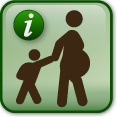Key points
If you are pregnant, speak with a medical professional as soon as it is safe. Radiation can have serious effects on your baby, even if you feel healthy. This includes medical problems like stunted growth and cancer, or possibly a miscarriage.

Radiation emergencies and pregnancy
After a radiation emergency, follow instructions from emergency officials and seek medical attention as soon as emergency officials say it is safe to do so.
Prenatal radiation exposure occurs when a pregnant woman's abdomen is exposed to radiation.
For most radiation exposures, the radiation dose to the fetus is lower than the dose to the pregnant woman. The abdomen partially protects the fetus from radiation sources that are outside the body.
If you swallow or breath in radioactive materials, these may be absorbed into your bloodstream. If you are pregnant, radioactive materials may pass from the blood through the umbilical cord to the fetus. Radioactive materials can also concentrate in areas of your body near the womb and expose the fetus to radiation.
Health effects to the fetus from radiation exposure can be severe, even at radiation doses too low to make you sick. These health effects can include:
- Miscarriage
- Stunted growth
- Deformities
- Abnormal brain function
- Cancer
A fetus is most sensitive to radiation between weeks 2 and 18 of pregnancy. A fetus will become less sensitive to radiation during later stages of pregnancy.
In the rare event of a radiation emergency, radiation experts can answer questions from you and your healthcare providers about radiation exposure and pregnancy.
What to do
Pregnant women should follow the same protective action instructions as everyone else. If pregnant women are advised to visit a community reception center (CRC) they should let CRC staff know about their pregnancy so that they can receive additional attention.
Contact your doctor for additional information. Your doctor can help you understand more about the risks of radiation exposure to you and to your developing baby.
